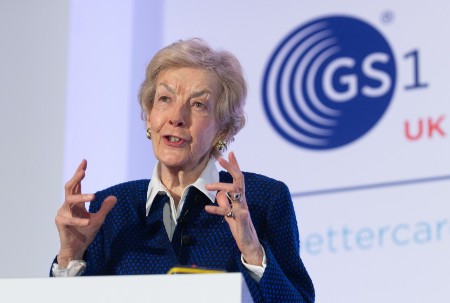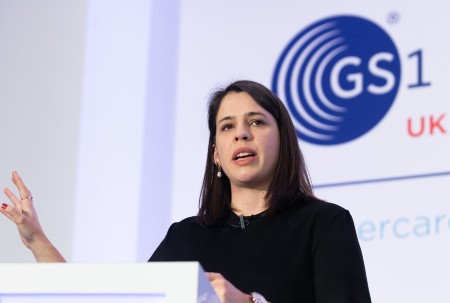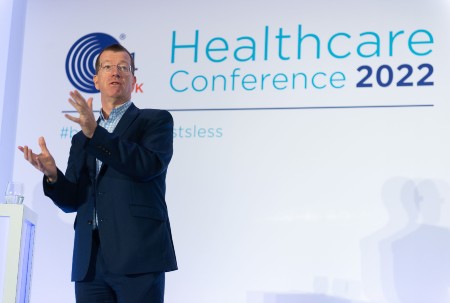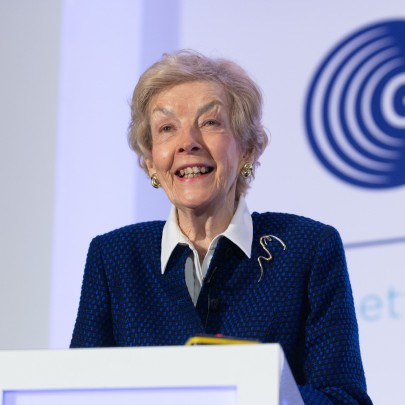April 22, 2022
At the beginning of 2020, before the pandemic changed the world, Baroness Julia Cumberlege went on a visit she describes as “a revelation”. It was to University Hospitals of Derby and Burton NHS Foundation Trust and was to see the organisation’s Scan4Safety programme, through which every item used on a patient is scanned and recorded before use.

Baroness Cumberlege was in the process of conducting her review into the use of Primodos (an oral hormone pregnancy test), sodium valproate (for epilepsy), and pelvic mesh (used to treat pelvic organ prolapse and stress urinary incontinence). These treatments have caused avoidable harm to many thousands of women and children, yet lack of data means it is impossible to know how many or even which.
It’s why the visit to University Hospitals of Derby and Burton NHS Foundation Trust, and learning more about Scan4Safety, had such an impact. “It brought home to me the power of data.”
Baroness Cumberlege was speaking at the 2022 GS1 UK Healthcare Conference, held in London in March. And her comments spoke to the central message of the event: the crucial importance of traceability in clinical settings, and the way in which point of care barcode scanning can power just that.
The pandemic meant it was the first in-person conference held by GS1 UK Healthcare in three years, and also meant there was much change to reflect on.
A clear message from the more than 50 speakers who took to the stage was that healthcare digitisation and use of technology has advanced since covid hit. Dealing with a novel virus, and the extreme pressures it has presented, has in some instances meant a willingness to innovate quickly that was not previously present – including on clinical traceability. Delegates heard about plans to replicate Scan4Safety programmes in Wales and Scotland, for instance.

In England, meanwhile, the “real influx of digital technologies” in the past two years is part of the reason NHS England is implementing a national digital clinical safety strategy. Dr Kelsey Flott, deputy director of patient safety at NHS England and Improvement, explained that includes a focus on traceability – building on Scan4Safety with the electronic point of care traceability programme (ePOCT).
“This work is about using barcode scanning technology to capture and link devices,” she said. “That’s implanted medical devices as well as consumables, people – clinicians and patients – and really crucially location as well.”
For leaders at the Medicines and Healthcare products Regulatory Agency (MHRA), scanning at scale brings hope of preventing the sort of issues on which Baroness Cumberlege reported. Explained chief safety officer Alison Cave: “We need to be able to have that complete, accurate, unambiguous identification and then link through to those long term health outcomes. That will help us at the MHRA to identify those safety signals, and then put in appropriate risk mitigation.”

While there was delight among both speakers and delegates at being able to return to a face to face conference, there was also clear acknowledgement that the difficult days of covid are far from over.
Andrew Goddard, president of The Royal College of Physicians, gave a stark and powerful presentation about the experience of being a clinician over the past two years. “Whilst politically it’s very nice to think the pandemic is fizzling out, that’s not the case,” he emphasised.
But in these dark times, he did see reasons for optimism – including on the further use of barcode scanning to power clinical traceability.
“If you have the right situations and the right conditions, you can transform rapidly, and it may be the pressures that we are seeing create that crucible where we can do things differently and have to do things differently in order to survive.
“I think the next five years is going to be really hard. But there are solutions, and tech is part of that,” he said.
And, as Baroness Julia Cumberlege put it to delegates: “Data can do remarkable things.”
